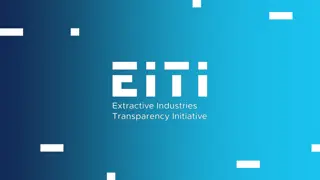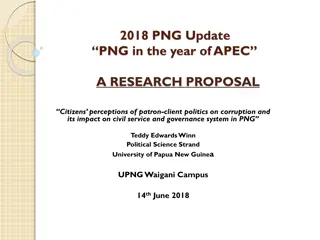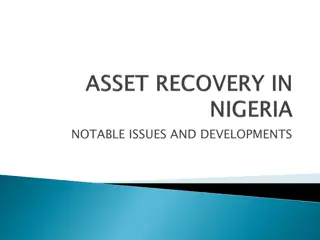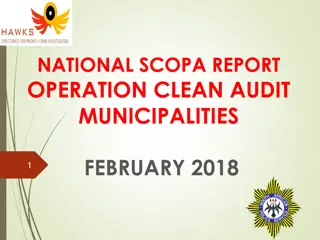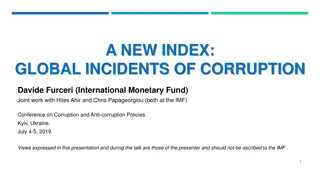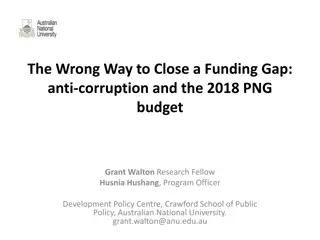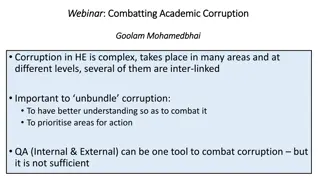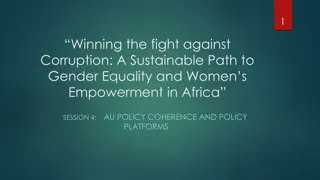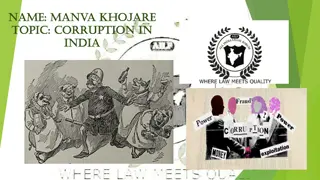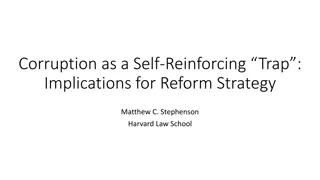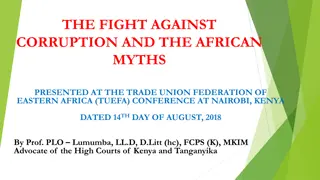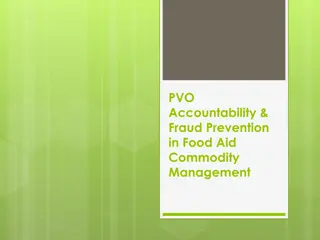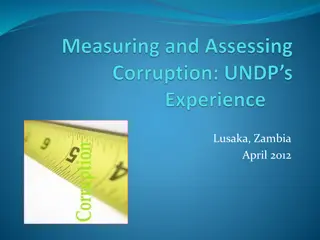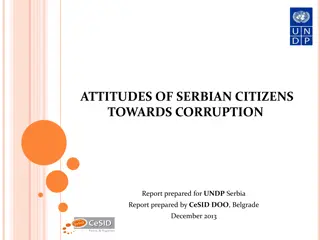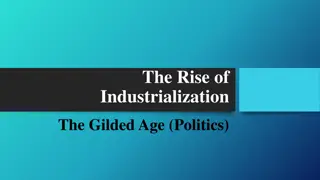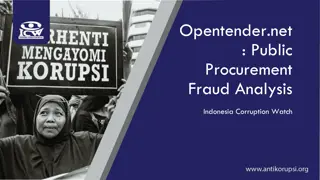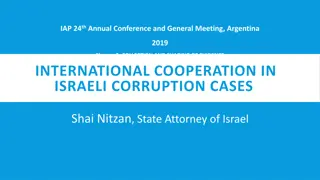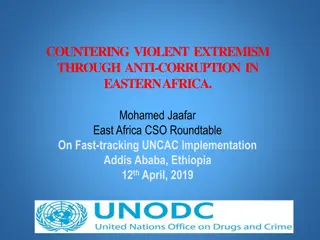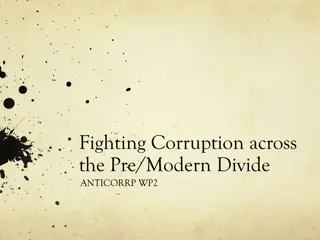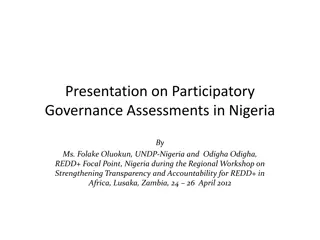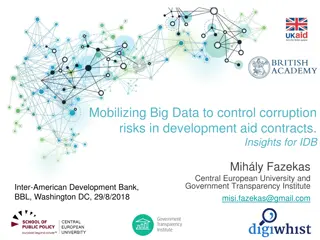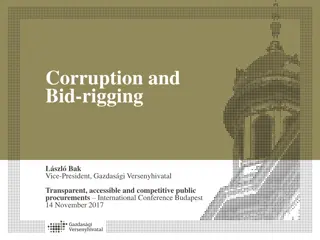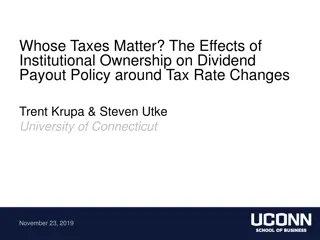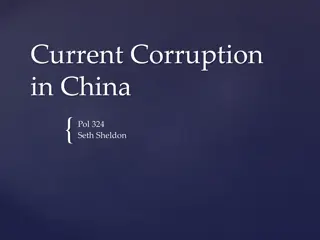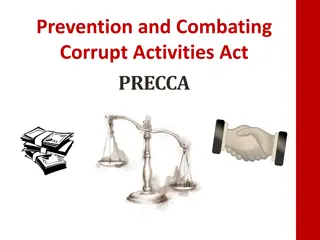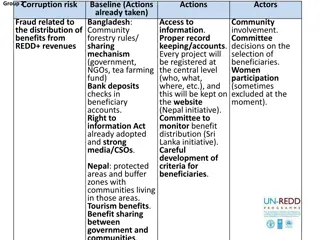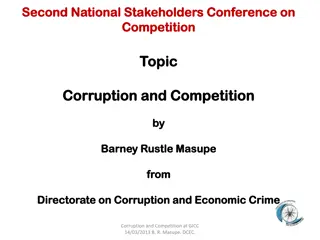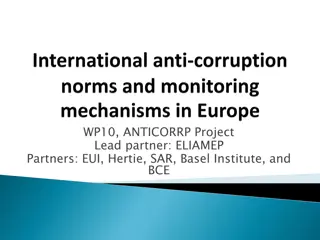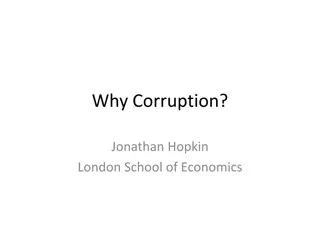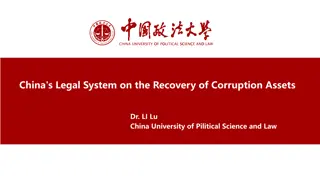INSTITUTIONAL GOVERNANCE FRAMEWORK
Currently, there is a lack of formal structure in the Institutional Housing Governance Framework (IHGF) within the public service system, leading to inefficiencies in managing institutional housing policies. This absence has resulted in deteriorating state assets, unmet housing demands, and ineffect
0 views • 17 slides
Inspectorate of Government Bi-Annual Performance Reports and Anti-Corruption Function Summary
The Inspectorate of Government in Uganda, led by the Inspector General Beti Kamya Turwomwe, presented bi-annual performance reports to Parliament for the periods January-June 2022, July-December 2022, and January-June 2023. The reports highlight the IG's mandate derived from the Constitution, focusi
1 views • 16 slides
Overview of Investigating Directorate Establishment and Functions
In March 2019, the President established the Investigating Directorate (ID) within the National Prosecuting Authority (NPA) to address corruption allegations. The ID has powers to subpoena witnesses, execute search warrants, compel testimony under oath, and prosecute cases. Through partnerships, the
1 views • 19 slides
Enhancing Anti-Corruption Activities in Extractive Sector Work Plans
Reflecting on anti-corruption activities in MSG work plans is crucial for good governance of oil, gas, and mineral resources. The EITI provides guidance on addressing corruption risks, with a recommended three-step approach: assess risks, develop an activity plan, and monitor results. Step 1 involve
0 views • 11 slides
Corruption and Anti-Corruption Measures in Latin America and the Caribbean
This research delves into the issue of corruption at the sub-national level in Latin America and the Caribbean, particularly focusing on the forest sector and the REDD+ program. It examines the vulnerable areas, corrupt practices, and lessons learned from case studies in Brazil and Bolivia. The stud
0 views • 28 slides
Analysis of Dario Fo's "Accidental Death of an Anarchist
Dario Fo's play "Accidental Death of an Anarchist" explores themes of police corruption, government collusion, and the suspicious death of an anarchist in police custody. The play delves into issues of impersonation, infiltration, and double-talk, shedding light on societal corruption and manipulati
0 views • 7 slides
Comprehensive Overview of Corruption Watch Submission on Public Procurement Bill [B18B-2023]
Corruption Watch, a civil society organization, presents a detailed submission on the Public Procurement Bill [B18B-2023], highlighting key areas such as legislative reform, public participation, preferential procurement, transparency measures, independence of procurement entities, anti-corruption m
0 views • 16 slides
Role of EITI in Addressing Corruption in Extractive Sectors
The Extractive Industries Transparency Initiative (EITI) plays a crucial role in combating corruption in the oil, gas, and mineral sectors globally. By exposing vulnerable practices, providing contextual information, supporting citizen engagement, and advancing anti-corruption norms, EITI helps dete
0 views • 9 slides
Perceptions of Patron-Client Politics on Corruption in Papua New Guinea: A Research Proposal
Investigate the impact of patron-client politics on corruption in PNG to understand its effects on civil service and governance. Analyze traditional and modern systems to identify prevailing patronage types and their influence on corruption. The study aims to redefine corruption in the PNG context f
0 views • 24 slides
Fighting Corruption and Asset Recovery Efforts in Nigeria
The Nigerian government has implemented various measures to combat corruption, enforce laws, engage the public, and recover assets. Notable initiatives include the prevention of corruption, enforcement of sanctions, ethical reorientation, and the recovery of misappropriated funds. These efforts invo
1 views • 15 slides
Operation Clean Audit: Rooting out Corruption in Local Government
Operation Clean Audit aims to eradicate corruption in Local Government by prioritizing investigations, prosecuting corrupt officials, and strengthening anti-corruption legislation. The initiative has identified key focus areas to achieve its objective, including expediting investigations and ensurin
0 views • 7 slides
Global Incidents of Corruption: A New Index by Davide Furceri
Davide Furceri from the International Monetary Fund discusses the need for a new index of corruption, construction methodology, impact on the economy, and progress in measuring corruption. The presentation emphasizes the IMF's active role in combating corruption worldwide.
3 views • 32 slides
Analysis of Anti-corruption Funding Discrepancies in the 2018 PNG Budget
The study examines the funding allocation and actual spending for anti-corruption organizations in the 2018 budget of Papua New Guinea, highlighting decreases in funding for crucial entities like FIU/FASU, Fraud Squad, ICAC, and Auditor General over the years, raising concerns about the government's
0 views • 24 slides
Strategies for Combating Academic Corruption in Higher Education
Corruption in higher education is a multifaceted issue that requires unbundling to effectively combat. Strategies include creating awareness, sharing resources, focusing on prevention over punishment, and implementing internal quality assurance systems. Actions within and outside higher education in
0 views • 6 slides
Importance of Ethical Business Practices and Anti-Corruption Policies
Achieving goals ethically is emphasized in the excerpts, highlighting the harmful impact of corruption on development and governance. ASC's commitment to safety, integrity, and ethical behavior is outlined, including a zero-tolerance policy towards bribery. The content stresses the importance of adh
0 views • 12 slides
Promoting Gender Equality and Fighting Corruption in Africa: AU Policy Coherence
Addressing the intertwining issues of corruption and gender inequality in Africa is crucial for sustainable development. This session will explore the complexities of corruption, engaging stakeholders, and the role of policy coherence in advancing women's empowerment. Key areas of focus include inst
0 views • 17 slides
Understanding Corruption in India: Causes, Effects, and Solutions
Corruption in India is a significant issue affecting the economy and society at large. This article explores the definition of corruption, its prevalence in India, key causes, major players involved, comparison with global standings, and methods employed. Lack of effective management, inadequate ove
1 views • 18 slides
Unpacking Self-Reinforcing Corruption Patterns
Delve into the complex dynamics of self-reinforcing corruption cycles and their implications for reform strategies. Explore how widespread corruption weakens deterrence, strengthens individual incentives for corruption, and impacts social norms against corrupt practices.
0 views • 45 slides
The Fight Against Corruption and African Myths in Review at TUEFA Conference
Prof. PLO Lumumba delivered a compelling speech addressing corruption and African myths at the TUEFA Conference in Nairobi. The presentation highlighted the cultural and colloquial definitions of corruption, emphasizing its widespread impact in Africa. The origins and causes of corruption in Africa
0 views • 23 slides
Corruption and Accountability in Food Aid Management
Corruption in humanitarian aid, particularly in the management of food aid commodities, deprives the most vulnerable of essential resources, hindering the noble goal of saving lives during crises. Examples from the Liberia-Sierra Leone refugee crisis shed light on the rampant corruption, where benef
0 views • 16 slides
Challenges in Measuring Corruption: Tools, Methodologies, and Solutions
The dilemma of measuring corruption lies in the diverse definitions, perceptions, and manifestations across societies. This article discusses the value of measuring corruption, the existing tools and methodologies, their limitations, and the need for more customized and credible indicators. It also
0 views • 11 slides
Citizen Attitudes Towards Corruption in Serbia: A 2013 Report
Report prepared by CeSID DOO for UNDP Serbia in December 2013 delves into Serbian citizens' attitudes towards corruption, financial situations, and key problems. Findings reveal a mixture of optimism and concern among citizens regarding the direction of the country, highlight financial struggles fac
0 views • 27 slides
Challenges of Democracy and Corruption in the Gilded Age
The Gilded Age (1877-1900) was a time of political inaction and widespread corruption, raising doubts about the endurance of democracy in the face of powerful corporations and wealthy individuals. The era saw a balance of power with partisan divides making lawmaking difficult. Presidents like Ruther
0 views • 11 slides
Unveiling Public Procurement Corruption Trends in Indonesia
Public procurement in Indonesia faces significant corruption risks, with a substantial portion of the state budget allocated to the sector. Opentender.net provides valuable insights into fraud analysis and trends, highlighting the importance of monitoring and improving the procurement process to bri
0 views • 19 slides
International Cooperation in Israeli Corruption Cases - Highlights of IAP 24th Annual Conference
Explore the intricate web of international cooperation in Israeli corruption cases through notable examples like the extradition of Dan Cohen and investigations into Siemens. The cases involving high-profile figures like the Prime Minister highlight the complexities and legal actions taken. The purs
0 views • 10 slides
Countering Violent Extremism Through Anti-Corruption in Eastern Africa
The project aims to pilot the impact of countering police corruption on radicalization and acts of violent extremism in Eastern Africa. By increasing internal anti-corruption oversight, empowering communities to report corruption effectively, and promoting collaboration between community, police, an
0 views • 17 slides
Uncovering Corruption: Bridging the Pre/Modern Gap
Exploring the history of corruption across different eras, a research project delves into premodern and modern societies to understand the factors influencing corruption and strategies to combat it. Through workshops, presentations, and publications, the project aims to redefine success in governanc
0 views • 6 slides
Challenges and Opportunities in Participatory Governance Assessments in Nigeria
Nigeria faces challenges in governance such as corruption, weak institutions, and environmental degradation. The presentation highlights ongoing assessments to enhance governance in urban areas and combat corruption in key sectors. Recommendations include strengthening systems, addressing corruption
0 views • 11 slides
Understanding Corruption, Governance, and Societal Norms
Alina Mungiu-Pippidi delves into the complexities of corruption, governance regimes, and societal norms, emphasizing the need to transform governance systems rather than just combat illegal corruption. She explores the concepts of corruption at the individual and societal levels, governance regimes,
0 views • 30 slides
Institutional Effectiveness and Assessment at B-CU
Jennifer Dash, Director of Institutional Assessment, and Dorian Hooks, Institutional Assessment Coordinator at B-CU, lead the efforts in understanding institutional effectiveness and assessment. Capacity building, creating a common vision, and a framework for institutional effectiveness are highligh
0 views • 35 slides
Leveraging Big Data for Monitoring Corruption Risks in Development Aid Contracts
Explore insights on utilizing big data to enhance oversight and control corruption risks in development aid contracts, focusing on innovations in corruption measurement, data mobilization for development, and widening access to combat corruption. Understand corruption proxies, underlying data, and c
0 views • 47 slides
Understanding Corruption and Bid-Rigging in Public Procurements
Explore the terminology, statistics, and possible scenarios of corruption and bid-rigging in public procurements as presented at an international conference in Budapest. The presentation highlights bid-rigging patterns, corruption behaviors, statistics on fines and cartel cases, typical scenarios, a
0 views • 15 slides
Effects of Institutional Ownership on Dividend Payout Policy
This study examines how a firm's ownership structure, particularly institutional ownership, influences its dividend policy around tax rate changes. It explores the impact of tax-sensitive/insensitive institutional ownership, the role of dedicated institutions as monitors, and the interaction between
1 views • 26 slides
Understanding Corruption in China: Insights and Reforms
The state-controlled nature of many prominent businesses in China, mixed with instances of corruption and inefficiency at various levels, highlights challenges faced by the government and public discontent. Economist Adam Hersh suggests a complex relationship between government-owned and privately o
0 views • 10 slides
Understanding the Prevention and Combating of Corrupt Activities Act (PRECCA)
The Prevention and Combating of Corrupt Activities Act (PRECCA) aims to prevent and combat corruption in both government and the private sector. It establishes measures to prevent corruption, defines various corrupt activities, and imposes obligations on individuals and entities to report corruption
0 views • 15 slides
Corruption Risk Mitigation Strategies in Forest Management Projects
Various corruption risk mitigation actions have been implemented in forest management projects in Bangladesh, Nepal, and Sri Lanka. These actions include community involvement, transparency mechanisms, stakeholder engagement, and legal awareness programs to prevent fraud and elite capture. Strategie
0 views • 5 slides
Understanding Corruption and Competition in Botswana: Insights from Barney Rustle Masupe
Directorate on Corruption and Economic Crime (DCEC) in Botswana tackles corruption through investigation, prevention, and education. Corruption is defined as the misuse of public office for personal gain. Corrupt activities include soliciting, offering, or receiving valuable consideration. Barney Ru
0 views • 19 slides
International Anti-Corruption Frameworks and State Compliance
Scholarship on state compliance with international law and the impact of anti-corruption standards on domestic policies is growing, yet there is a lack of systematic studies on how states comply with and implement these standards. Various organizations and conventions focus on combating corruption a
0 views • 10 slides
Understanding Corruption and Its Implications on Institutions and Society
Corruption, as discussed by Jonathan Hopkin from the London School of Economics, is viewed through various lenses - from a reflection of traditional hierarchical ties in modernization theory to the inadequacy of political institutions. Economists highlight how corruption distorts market allocation.
0 views • 8 slides
China's Legal System on Recovery of Corruption Assets - Insights by Dr. Li Lu
The article discusses China's legal system concerning the recovery of corruption assets, highlighting the working mechanism and legal provisions in place. It delves into the role of the National Commission of Supervision and key authorities, as well as mechanisms for voluntary return, special confis
0 views • 17 slides

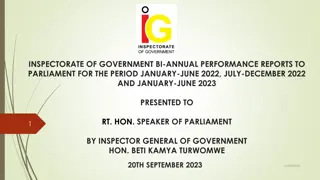
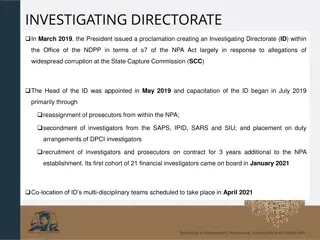
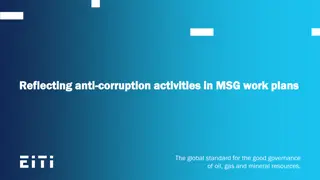
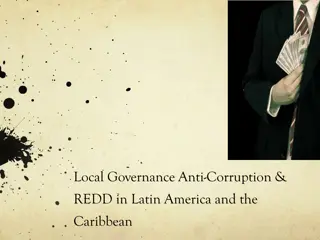
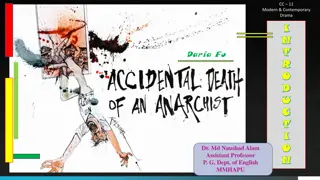
![Comprehensive Overview of Corruption Watch Submission on Public Procurement Bill [B18B-2023]](/thumb/138344/comprehensive-overview-of-corruption-watch-submission-on-public-procurement-bill-b18b-2023.jpg)
